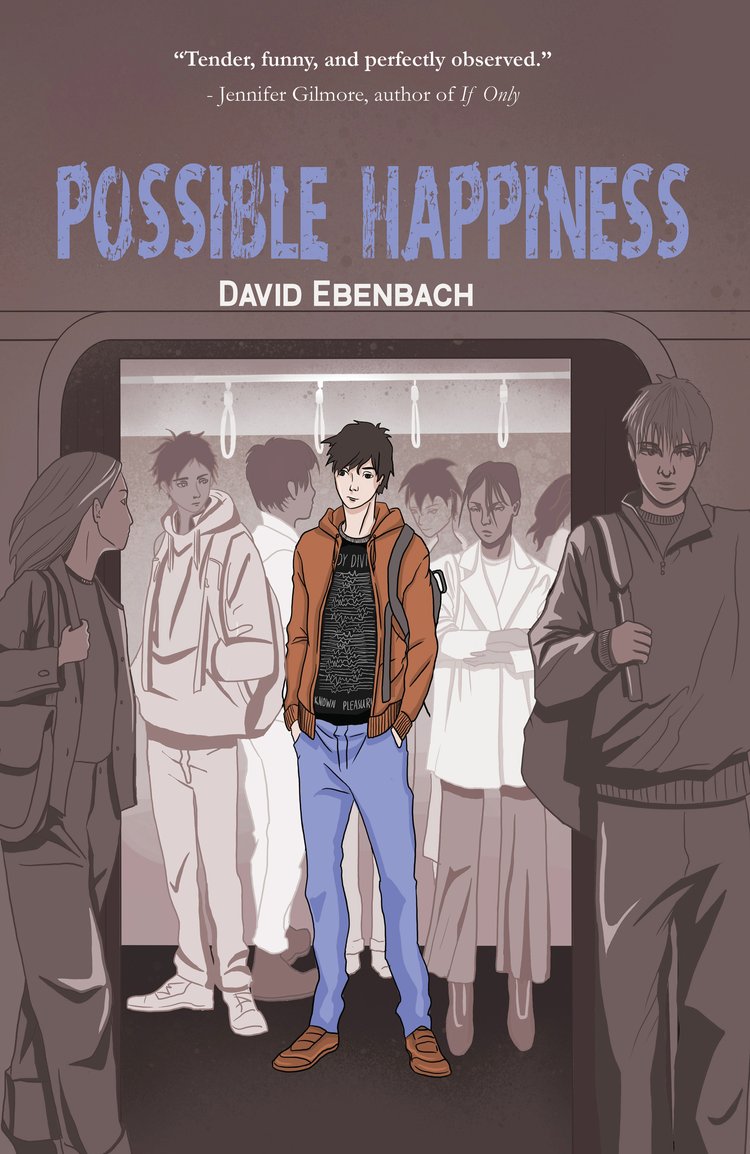reprinted with permission from Work in Progress

Give us your elevator pitch: what’s your book about in 2-3 sentences?
A loner teen accidentally unlocks a social life with his sense of humor—but can he unlock meaningful happiness that way, too, or will he first have to face and understand himself?
Which character did you most enjoy creating? Why? And which character gave you the most trouble, and why?
The book is told from the point of view of Jacob—that loner teen from the elevator pitch—and I really enjoyed spending time with him. He’s based (very loosely) on a teenaged me (and the book is set back in the late 80s, when I was a teenager), and so it was like hanging out with a version of my younger self, getting to observe all of the hopeful foolishness and chaotic earnestness—but from a semi-safe distance this time around.
His friends were harder to write, because of the particular nuance I was trying to capture: that these characters could be perfectly great people, and yet still struggle to supply whatever it was that Jacob ultimately needed. In that way, folks can be disappointing without actually being at fault.
Tell us a bit about the highs and lows of your book’s road to publication.
Well, the lowest low was when my agent told me that the book wasn’t to his taste and didn’t feel like he was the right person to submit it to presses. Yeah—that was a low point. He said it nicely, though—he’s still my agent—and he told me it was okay if I wanted to take it out to presses myself. He’s not a possessive guy. And so I did take it out myself, and luckily found people who connected with the book more than my agent did.
In particular, Regal House Publishing got excited. So one big high was them sending the contract, and me signing it. After that, there were the usual rounds of editing and proofreading and finalizing a cover and so on, all of which were smooth. And then, finally—I started working on this book back in 2016—Regal House sent me a physical copy of the book. That’s a very high point right there. As Salman Rushdie writes in his excellent new memoir, Knife, “the best moment of the whole process of book publication is this one, the moment when you hold your printed book in your hand for the first time, and you feel its reality, its life.”
What’s your favorite piece of writing advice?
Don’t write what other people want you to write; write what you have to write.
My favorite writing advice is “write until something surprises you.” What surprised you in the writing of this book?
This is such an interesting question, and a hard one for me to answer. In a certain sense, everything surprises me when I write a book—I never know how it’s going to play out before I get to the page. Or at least I never know that I know. Because, in another sense, nothing about the process surprises me. In fact, I typically write not toward surprise but instead toward whatever is most emotionally difficult for me to get into. The hard stuff that’s already there and that maybe I’m somewhat aware of, the way that you’re aware of shadows in the room, but that I haven’t been willing to look at directly. And so, a lot of the time my writing process is more about uncovering than about discovering. Maybe the surprise, each time, is that I’m able to go there—and come back out unharmed.
How did you find the title of your book?
Coming up with Possible Happiness, the title of this book, was a process. Oy. For a long time I called it Fern Rock, after the Philadelphia Broad Street Subway stop—but that made it sound like the novel was happening in some rural paradise instead of in one of the grittiest cities in America. So I lost faith in that option and just called the book “that high school novel” for a long time. It remained “that high school novel” through failed experiments with titles like Where Do the Children Go (based on a song from the time), Subway-Surface (based on public transportation), and We’re Getting There (the actual, I’m-not-making-it-up slogan of SEPTA, Philly’s public transportation organization, for many years). None of it really suited this particular high school novel.
And then I thought about the scene where protagonist Jacob goes into a kind of occult shop on South Street where all of the purported potions have anti-lawsuit hedges in their names like “so-called” or “alleged,” and he sees something called Possible Happiness Syrup. I thought: that’s what my guy needs. He needs a possible happiness. He needs to stop fighting for some generic kind of happiness that works for everyone else or some magical kind of happiness that only works in the movies. He needs to turn his effort toward getting a real happiness, one that’s possible for him.
Inquiring foodies and hungry book clubs want to know: Any food/s associated with your book?
Well, the main character is a teenager, and not so great in the kitchen, so he’s not the kind of person who produces recipes. When he’s home alone, his single mother working yet another double-shift, he just heats up some frozen mac’n’cheese. So maybe that could make for a good book club treat? Though, if you want to be true to the time period (late 80s), you’ll have to find the Stouffer’s frozen mac that comes in a foil tray, and you’ll have to heat it up in a conventional oven. It takes a while, but it’s worth it.
*****
READ MORE ABOUT THIS AUTHOR: https://www.davidebenbach.com/
ORDER THIS BOOK FOR YOUR OWN TBR STACK: https://regal-house-publishing.mybigcommerce.com/possible-happiness/